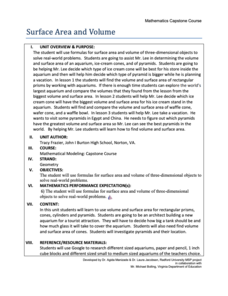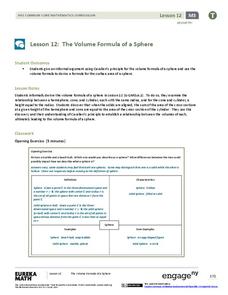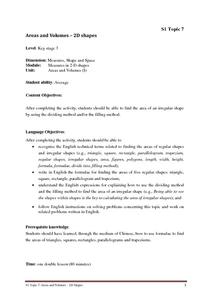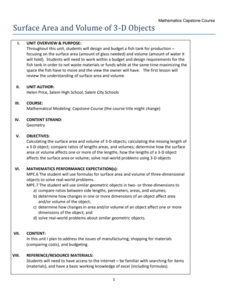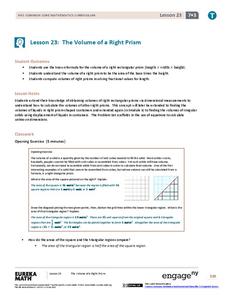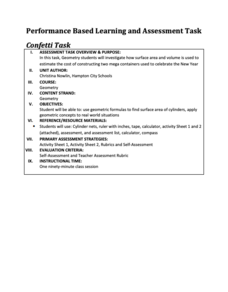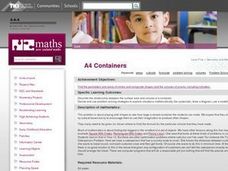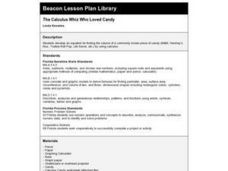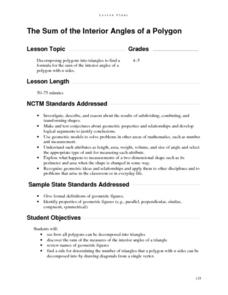EngageNY
The Volume Formula of a Pyramid and Cone
Our teacher told us the formula had one-third, but why? Using manipulatives, classmates try to explain the volume formula for a pyramid. After constructing a cube with six congruent pyramids, pupils use scaling principles from...
Virginia Department of Education
Surface Area and Volume
Partners use materials to wrap three-dimensional objects to determine the formula for surface area. The groups use an orange to calculate the amount of peel it takes to completely cover the fruit. Using manipulatives, individuals then...
Radford University
Surface Area and Volume
Who knew there were pyramids in China? Learners apply surface area and volume formulas to several different real-world situations. They calculate the volume and surface area of an aquarium, an ice cream cone, and Egyptian and Chinese...
EngageNY
The Volume Formula of a Sphere
What is the relationship between a hemisphere, a cone, and a cylinder? Using Cavalieri's Principle, the class determines that the sum of the volume of a hemisphere and a cone with the same radius and height equals the volume of a...
Government of Hong Kong
Areas and Volumes - 2D Shapes
Unfortunately for young mathematicians, the world isn't made entirely of parallelograms, triangles, and trapezoids. After first learning the area formulas for these common shapes, students apply this new knowledge to...
Radford University
Surface Area and Volume of 3-D Objects
Don't let the class tank the project. After reviewing formulas for surface area and volume, pupils design fish tanks that maximize volume. They research cost of materials online and must meet a budgetary constraint when creating their...
Virginia Department of Education
Exploring 3-D Geometry
Take young mathematicians on an exploration of the world of 3-D geometry with this seven-lesson unit. After first defining the terms perimeter, area, and volume and how they apply to the real world, students continue on...
EngageNY
The Volume of a Right Prism
Does the volume formula work even if the measurements are not whole numbers? Class members work simple problems to find that the formula (area of the base) × (height) works for all prisms, independent of measurements and shape.
Mathematics Vision Project
Module 5: Circles A Geometric Perspective
Circles, circles, everywhere! Pupils learn all about circles, central angles, inscribed angles, circle theorems, arc length, area of sectors, and radian measure using a set of 12 lessons. They then discover volume formulas through...
EngageNY
The Scaling Principle for Area
As they investigate scaling figures and calculate the resulting areas, groups determine the area of similar figures. They continue to investigate the results when the vertical and horizontal scales are not equal.
EngageNY
The Volume of Prisms and Cylinders and Cavalieri’s Principle
Young mathematicians examine area of different figures with the same cross-sectional lengths and work up to volumes of 3D figures with the same cross-sectional areas. The instruction and the exercises stress that the two...
EngageNY
Volume of Right Prisms
Apply volume and area formulas to find the volume of any right prism. The 26th lesson of a 29-part module examines methods for finding the volume of right prisms with varying shapes of bases. Learners use the formula V = Bh to find...
Radford University
Confetti Task
Using the net of a can, learners develop formulas for the surface area and volume of a cylinder. They then apply their formulas to solve problems about a cylindrical container used to disperse confetti.
Radford University
Alpaca Lunch
Feed the need for knowledge. Future mathematicians first consider how the lateral area of a rectangular prism relates to its volume. They then design a container for alpaca food that has the maximum volume possible from a given sheet of...
Pie Council
National π Day
Learners can enjoy pi with pie! A collection of short activities celebrates pi day with a word search, a maze, and real-world problemsn. Using pi in formulas for area, circumference, and volume as well as exploring simple fractions is...
Mrs. Burke's Math Page
Let Them Eat Pi
Looking for a fun and creative way to celebrate Pi Day? Then this is the resource for you. From a scavenger hunt and trivia contest to PowerPoint presentations and skills practice worksheets, this collection of materials is a...
Teach Engineering
Rock and Boat
Present the class with a question on whether the water level of a pond will rise they take a large rock out of a boat and drop it into the pond. Groups come down on all sides of the question and try to justify their answers. The activity...
Curated OER
A4 Containers
Fifth graders determine which container made from a single sheet of paper has the greatest volume. They look the solutions made by three different students before working on their own examples.
Curated OER
The Calculus Whiz Who Loved Candy
Students develop an equation for finding the volume of a commonly known piece of candy (M&M, Hershey's Kiss, Tootsie Roll Pop, Life Saver, etc.) by using calculus.
Improving Measurement and Geometry in Elementary Schools
The Sum of the Interior Angles of a Polygon
Junior geometers discover that polygons can be decomposed into triangles and that the number of triangles can be determined by a rule. Note that the Geometer’s Sketchpad® software is required to carry out all components of this...
Workforce Solutions
30 Seconds
Thirty seconds are all scholars have to develop an engaging commercial to showcase their talents and experience within a specific occupation. Pairs work collaboratively to keep each other on time to deliver information speedily and ask...
Curated OER
What's Your Line?
Fifth graders collect temperature readings over a period of time, enter the information into a spreadsheet and choose the appropriate graph to display the results.
Curated OER
Geometry in Nature
Students examine how the circumference, diameter, and the relationship of Pi of a circle are related. They count the summer rings of a tree to determine its growth.
Curated OER
The Strongest Shape
Learners work collaboratively to design and construct a roof out of Legos for a house that was built in a previous lesson. The roof must be structurally sound and pass certain criteria determined by the teacher.


